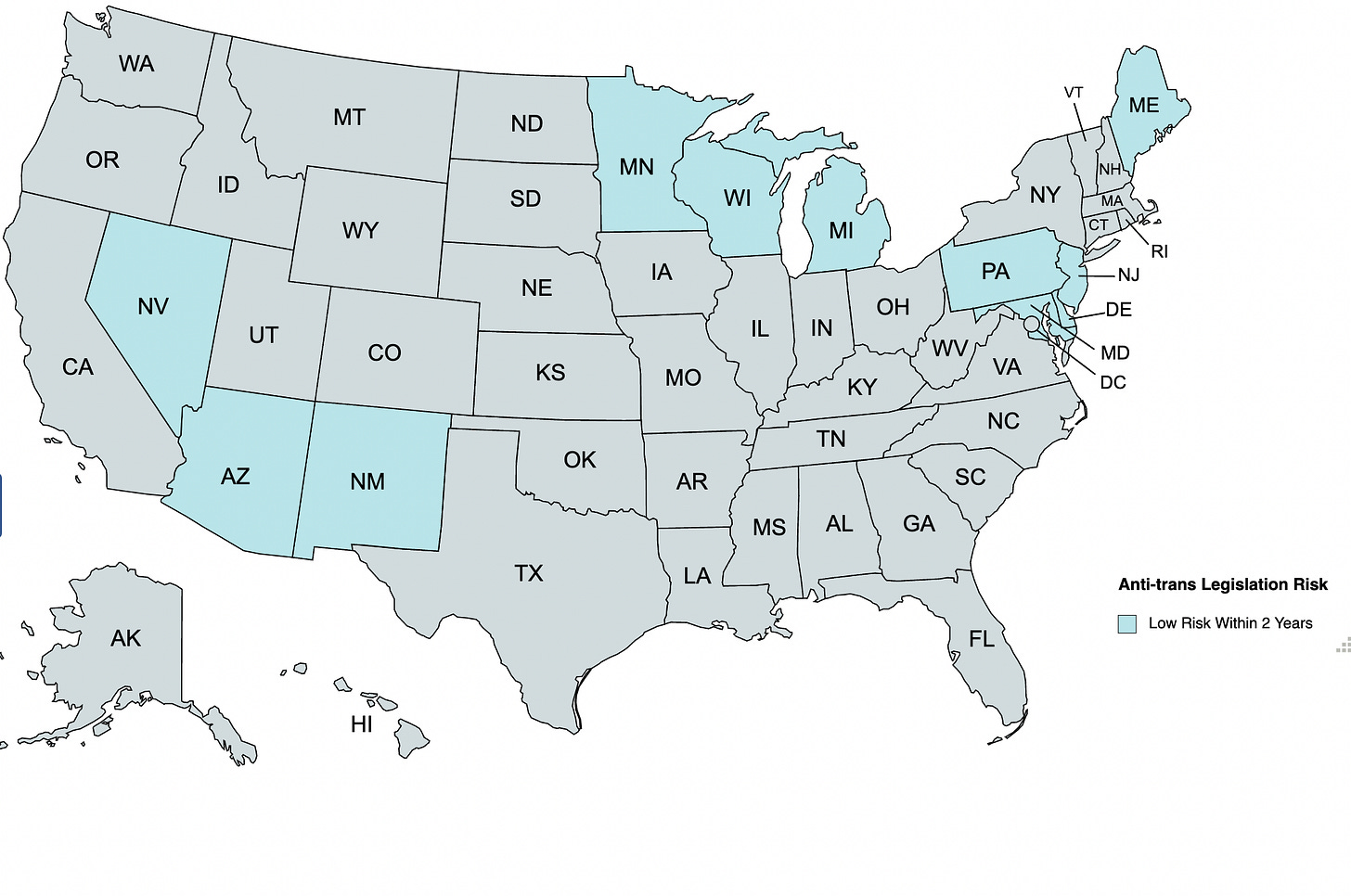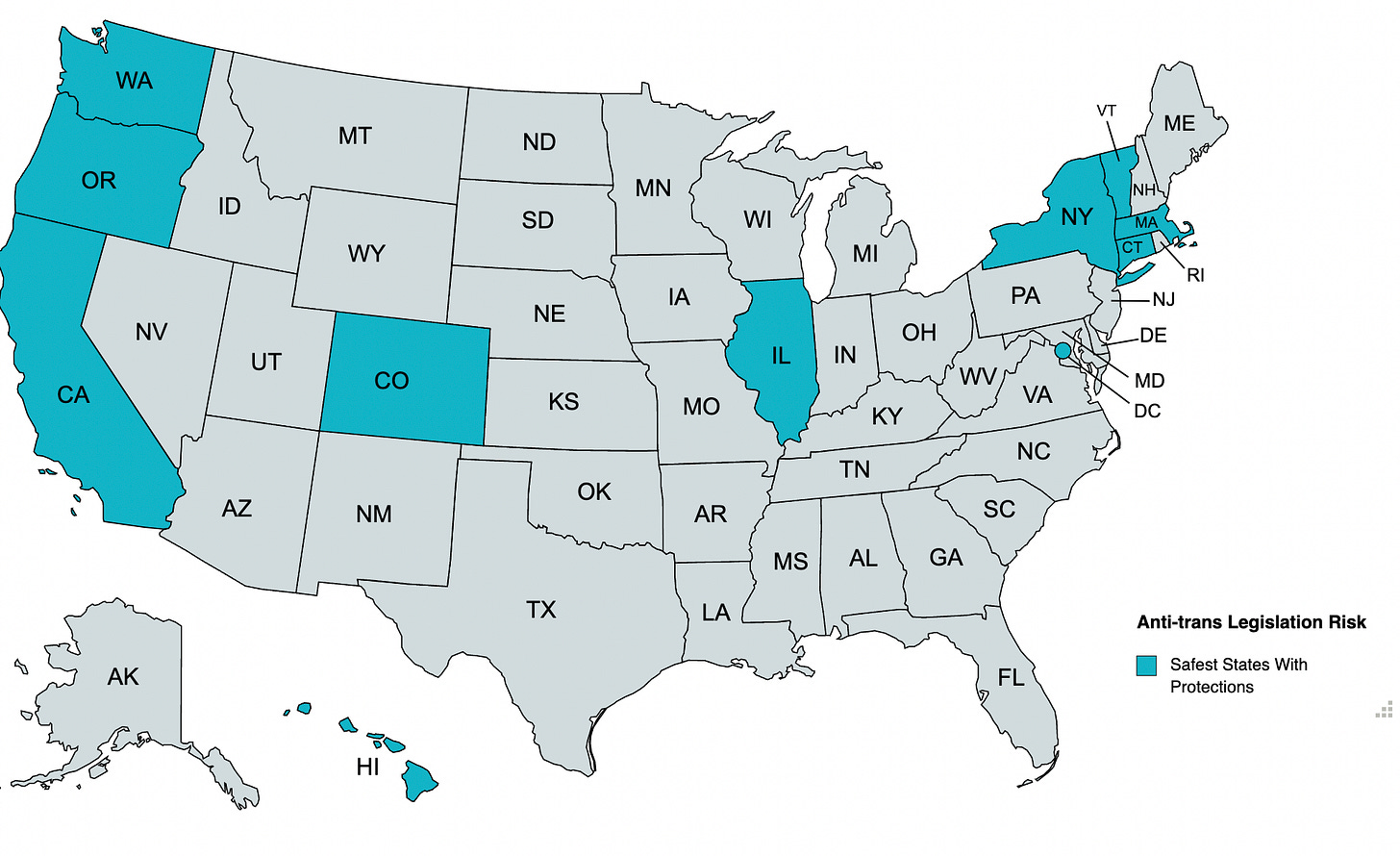The Final Anti-Trans Legislative Risk Map Of 2022
This map helps you determine the likelihood your state will pass anti-trans legislation in the next 2 years. If you are moving or looking to move, or make other decisions, please use this map!
***THIS MAP IS OUT OF DATE***
There is a new, more up to date version of this map here!
About The Map
I have tracked anti-transgender legislation for 3 years @erininthemorn on Twitter and TikTok. Every day, I’ve gotten messages from worried people wondering how they are supposed to assess their risk of staying in their home state. The messages range from parents of trans youth wondering if their children will be taken from them to trans teachers wondering if their jobs will be safe in coming years. Sometimes people just want to know if there is a safer state they can move to nearby.
I created the post-election legislative risk map specifically to help answer that question. Now more than ever, it is a question that needs answering, considering states like Texas are actively proposing rounding up trans kids and taking them from their parents.
Methodology
The methodology I use is qualitative. I know the partisan breakdowns of the various states. I have watched hundreds of hours of hearings on anti-trans legislation and am fully aware of all of the players nationally as well as where they are making their pushes against trans rights. I have followed the vote count and talk to activists on the ground in each state. I also take into account election results - the last election shifted several states into lower risk due to Democratic victories at the state level. Lastly, I watch for statements by governors and bill drafts to see if the Republican party in various states seems to be pushing anti-trans legislation heavily - you can see many examples of such legislation on this Substack.
Changes Since Last Map
I wrote extensively about how the election affected the landscape in the previous map release post-election. Many states risk categories lowered. Wisconsin, Kansas, Pennsylvania, Michigan, and Arizona saw substantial drops in risk due to Democratic gains or keeps. These states still maintain their current risk categories since our last release post-election, although I am still keeping an eye on Arizona as we have had our first anti-trans piece of legislation filed in that state indicating that the GOP is going to keep pushing such legislation even in the face of a Democratic victory at the governor level.
The biggest changes to this update of the map come in Mississippi and New Hampshire. Mississippi sees a substantial increase in risk. Mississippi previously had been a much lower risk level than many other states in the south. This is because unlike nearby states, Mississippi had defeated all of its anti-trans legislation very early in committee and it had seemed like the state legislature there had no real appetite to pass anti-trans bills, even in the face of nearby states passing multiple anti-trans bills. The Mississippi Governor, however, announced recently that he will be making anti-trans bills a major component of his agenda. Given the Republican makeup of Mississippi, it was finally time to raise its risk level to high accordingly.
In the case of New Hamsphire, I had held off on keeping its risk level anything but low. However, Republicans do have power in New Hampshire and just recently, we saw one of the worst bills introduced of any state in New Hampshire. Republicans in New Hampshire submitted an HRT ban that would ban gender affirming care all the way up to 21 years old, which would include trans adults. This would be untenable and represents a major escalation in the state. As such, I can’t justify keeping New Hampshire low risk given its partisan breakdown - keeping in mind that New Hampshire Republicans operate quite differently from Southern ones. I think New Hampshire residents must remain vigilant and will raise its risk to moderate.
The Worst States
Alabama
Arkansas
Florida
Oklahoma
Tennessee
Texas
These states have passed the worst anti-transgender legislation or enforced existing laws against transgender already. The worst laws appear in these states. Texas is home to the weaponization of DFPS against transgender people. Oklahoma, Alabama, and Tennessee have all recently passed bathroom laws. Alabama and Arkansas have passed laws that detransition all trans teens. Florida has banned medicaid coverage for trans adults and is banning gender affirming care for trans teens. These are the states I get the most questions from people asking where they can flee
High Risk States
Idaho
Indiana
Kentucky
Louisiana
Mississippi
Missouri
Montana
Ohio
South Carolina
South Dakota
Utah
Virginia
West Virginia
These states are all in line to join The Worst States. They’ve all proposed laws that states in the higher risk category have passed. Missouri proposed anti-transgender laws that only were defeated because of an intra-party squabble over legislative redistricting which timed out all other legislation. Ohio currently is proposed a law to detransition all trans teenagers. Virginia is currently trying to force a school board policy that would ban trans students from bathrooms and force teachers to misgender and deadname them.
Some states defeated many of their anti-transgender laws this year and still maintain a significant risk profile going into the next cycle. Louisiana, which defeated most of its anti-transgender legislation, will be entering a new governors election next year. If a Republican wins, anti-transgender legislation that failed this year could be much more successful.
Lastly, some of these states have passed anti-trans legislation but defeated some of the most harsh anti-trans bills. Montana and Idaho defeated their youth detransition bills. However, with rising anti-transgender sentiment, these bills could see more progress within the next two years and indeed we are seeing states like Montana and Mississippi propose extremely harsh bills this year already.
Moderate Risk States
Alaska
Georgia
Iowa
Kansas
Nebraska
New Hampshire
North Carolina
North Dakota
Wyoming
These states all have a moderate risk of advancing some of the worst anti-transgender legislation in the next two years. Most of these states defeated all or most of their anti-transgender legislation. Many of these states didn’t even see full floor votes of the worst anti-transgender legislation. For example, North Carolina’s anti-trans medical care ban did not even get a committee hearing.
It is still likely that some or all of these states see anti-trans laws proposed, and it is also likely that at least a few of these states move up in risk level as more laws get passed.
Low Risk States
Arizona
Delaware
Maine
Maryland
Michigan
Minnesota
Nevada
New Hampshire
New Jersey
New Mexico
Pennsylvania
Rhode Island
Wisconsin
These states have a low risk of enacting extreme anti-transgender legislation within a single election cycle. Still, these states are unified by a lack of the strongest transgender protections. States in this category include states like Maryland, which failed to enact explicit healthcare protections or identity document protections. States like New Jersey, Rhode Island, and Delaware all lack major healthcare protections for transgender people and are not currently considering refugee bills protecting trans people who are fleeing the aforementioned unsafe states (Rhode Island’s consideration did not get submitted this cycle).
Some states like Minnesota maintain strong cultural acceptance of transgender people but still lack the legal protections of safe state laws and full medical coverage that the top states have, and a right-leaning election cycle could change the tide. Some states like Arizona and Wisconsin saw positive election results that make them likely low risk as Democratic governors have taken over.
Most Protective States
California
Colorado
Connecticut
Hawaii
Illinois
Massachusetts
New York
Oregon
Vermont
Washington
Washington, D.C.*
Transgender people in these states are better protected culturally and legally than in other states. States like Hawaii, Colorado, and Washington maintain explicit transgender healthcare policies that cover surgeries that often go without coverage in other states. Washington, D.C., Massachusetts, Connecticut, and California are currently considering policies or have passed policies that protect transgender refugees fleeing from other states.
Other states in this category like Illinois, Oregon, New York, Massachusetts, and Vermont maintain a strong history of transgender protections and show yearly legislation proposals to further protect transgender residents.








A student asked me how to find a place where he is not frightened all the time.
One answer is that every place sucks for people who are different.
But some places are clearly more risky than others.
Thanks for your work. I'm sad that it has to be done, but thank you.
Note: Pennsylvania is shown on the maps as Low Risk, but is not listed in text bullet points.
Thank you for this resource! I'm going to forward it to my local rural queer support group in NEPA.